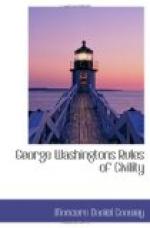Some of the Rules may strike the modern reader as snobbish, even for the observance of youth. But the originals are in that respect toned down in Washington’s MS. Rule 9 takes no cognizance of the principle of the original, that to approach nearer the fire than others, and to turn one’s back to it are privileges of persons of rank. The 17th Maxim of chapter iii., which directed certain kissings of the hands of superiors, or of the robe, and other abasements, is entirely omitted. Where the original commands that we should never dispute in any fashion with our superiors in rank, Rule 34 says we ought not to “begin” with them. The only thing clear about which is that the instructor did not wish to admit authority so absolutely into the realm of argument. Rule 46 omits so much of the original as counsels grateful acceptance of reproof from another “the more if you depend on his authority.” Other instances of this more liberal tendency will be noticed by those who make a careful comparison of the Rules and the French Maxims.
Here then are rules of conduct, taught, if my theory be correct, by a French protestant pilgrim, unknown to fame, in the New World. They were taught to a small school of girls and boys, in a town of hardly a hundred inhabitants. They are maxims partly ethical, but mainly relate to manners and civility; they are wise, gentle, and true. A character built on them would be virtuous, and probably great. The publisher of the English version (1665) says that “Mr. Pinchester, a learned scholar of Oxford,” bought 250 copies for a great school he was about to open in London. Probably the school founded by James Marye was the first in the New World in which good manners were seriously taught.[1] Nay, where is there any such school to day?
[Footnote 1: It is probable that Mr. Marye’s fine precedent was followed, to some extent, in the Fredericksburg Academy. The present writer, who entered it just a hundred years after George Washington recorded the “Rules,” recalls, as his first clear remembrance of the school, some words of the worthy Principal, Thomas Hanson, on gentlemanly behaviour. Alluding to some former pupil, who had become distinguished, he said, “I remember, on one occasion, in a room where all were gathered around the fire—the weather being very cold—that some one entered, and this boy promptly arose and gave the new-comer his seat at the fire. It made an impression on me which I have never forgotten.” And how long have lasted in the memory of the writer hereof the very words of our teacher’s homage to the considerate boy who obeyed Washington’s eighth Rule!]
Just this one colonial school, by the good fortune of having for its master or superintendent an ex-jesuit French scholar, we may suppose instructed in civility; and out of that school, in what was little more than a village, came an exceptionally large number of eminent men. In that school three American Presidents received their early education,—Washington, Madison, and Monroe.




